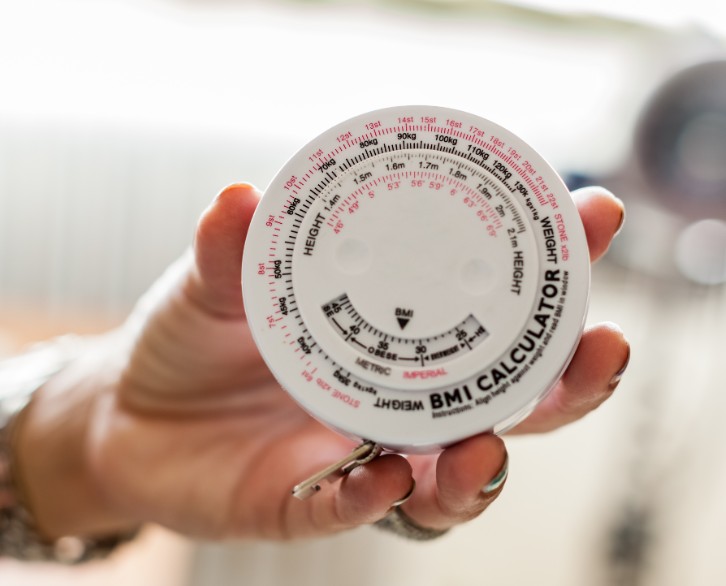
If you’re exploring the possibility of weight loss surgery, but you aren’t sure who qualifies, or how, this weight loss surgery checklist will help you navigate the process. Here’s a look at the medical requirements needed to qualify, as well as the physical and mental preparations required for weight loss surgery.
Are you a Candidate for Weight-Loss Surgery?
Do you know your BMI? That stands for Body Mass Index, which is a ratio of your height to your weight. Click here to calculate yours; you’ll need to know it to find out whether you qualify.
A BMI of under 18.5 is categorized as underweight, 18.5-24.9 is normal, 25-29.9 is overweight, and 30 or greater is obese.
The American Society for Metabolic and Bariatric Surgery sets the following qualifications for most bariatric surgeries:
- You have a BMI of 40 or greater, or are more than 100 pounds overweight, or
- You have a BMI of 35 or greater and at least one health condition that is obesity-related. These include type 2 diabetes, high blood pressure, sleep apnea, osteoarthritis, non-alcoholic fatty liver disease, heart disease, or gastrointestinal disorders, and
- You have been unable to lose enough weight or sustain your weight loss enough to achieve a healthy body through multiple attempts
- Surgeons also want to know that you will be able to follow very restrictive post-operative nutrition and exercise guidelines
Low BMI for Weight Loss Surgery: Do I Qualify?
How to Prepare for Weight Loss Surgery
There are multiple aspects to preparation for weight loss surgery. It helps to divide them into categories: lifestyle (food and nutrition), mental and emotional health, and then practical concerns, such as choosing a surgeon and facility, deciding on what surgery is best for you, and navigating the healthcare and insurance system.
Pre-Op Medical Routines
Before your weight loss surgery, you may have any of several medical tests, including bloodwork, X-rays, gastrointestinal tests and an electrocardiogram (EKG). This gives your surgeon detailed information about your health. You’ll also meet with:
- A registered dietician or nutritionist, who will assess your current weight and health issues and go over the post-op diet and exercise program;
- A psychologist, who will review any mental health issues and assess whether you are ready to have the surgery and commit to the needed changes in lifestyle;
- And possibly a physical therapist, who will discuss a post-op exercise plan that can expand as you lose weight and are able to do more.
Lifestyle Preparations
In the two to three weeks prior to surgery, your surgeon will give you a pre-op diet meant to shrink your liver and reduce the amount of fat in your abdomen, both of which makes your surgery safer. In general, you’ll be asked to cut out foods high in fat, carbohydrates, and sugar, and instead focus on lean, easily digestible proteins, such as protein shakes and low-calorie soups. As the date for your surgery nears, you may need to follow a diet that is mostly or all liquids.
You’ll also begin small amounts of exercise daily — maybe just 10 minutes of slow walking, for instance — which will slowly increase after your surgery.
Most bariatric surgery programs want you to avoid alcohol, and quit smoking before surgery; it reduces complications and helps prevent blood clots, anesthesia risks, and post-op infections.
Mental and Emotional Health
Research shows that weight loss surgery patients typically have a history of depression, anxiety or other mental disorders. A 2016 report in the Journal of the American Medicine Association reviewed 68 published studies concerning mental illness among bariatric patients, hoping to learn whether preoperative conditions affected post-operative results. Depression and binge-eating disorder were the most common conditions found; and the report determined that “moderate-quality evidence supports an association between bariatric surgery and lower rates of depression postoperatively.”
A visit with a psychologist before surgery accomplishes a few things. It evaluates how you are doing mentally at this point in time, your expectations of how the surgery will change your life, how you manage stress, and what strengths or weaknesses you have that could help or hinder your post-op success.
In addition, the psychologist will discuss food habits you may have developed that have provided comfort in the past, but that will not be available to you after surgery, such as emotional eating.
Choosing a Surgeon and Facility
One of the most important decisions you make will be the choice of your doctor and the facility where he or she operates. Obesity Action recommends that prospective patients do the following:
- Research the surgeon as much as you can, including primary website, Facebook page, LinkedIn page and medical facility page. Find out what types of bariatric surgery he or she performs and how long they’ve been doing it. Is the facility they use accredited in bariatric surgery?
- Look for online reviews to see what previous patients have to say about specific programs or doctors. Take the reviews with a grain of salt — folks on the internet often tend to complain more than praise — but this can provide useful information.
- Ask the surgeon if you can speak to a former patient or two. From them, you can find out what their experience was like, whether their calls were promptly answered, whether the surgeon and the office are easy to deal with (and helpful with insurance, etc).
- Consider going to an aftercare support meeting before your surgery to listen in on others’ experiences.
How to Find a Great Weight Loss Surgeon in Los Angeles
Deciding Which Surgery is Best for You
Once you’ve decided on a surgeon, the two of you will take into account everything about your health situation and talk about which weight loss surgery is best for you. Differences include recovery time, expected weight loss, invasiveness of each procedure, risks and possible complications of each procedure, and whether the procedure can be reversed or revised.
Navigating the Healthcare and Insurance System
Every insurance policy is different; some cover weight loss surgery while others do not. The staff members who file claims at your surgery facility should be a big help to you; they’ve worked with every insurer at some point. Differences in coverage vary by state, employer, and insurance carrier.
If your health insurance does cover bariatric surgery, you will need to show why it is necessary, which may require a combination of medical tests and documentation from both your primary care doctor and your bariatric surgeon.
If you’re covered, your insurance will likely pay 80% of the “customary and usual” fees for the surgeon, anesthetist, and facility; your copay amount can range from small to significant. Medicare covers gastric bypass surgery for people 65 and older who have a BMI of 35 or higher and a weight-related health issue, such as diabetes or heart disease.
Download our Free Weight Loss Surgery Toolkit
There are three main areas you’ll want to learn about as you research bariatric surgery: preparation and recovery; your surgeon and facility; and how your insurance applies to your situation.
For more detailed information on these and other topics, download our Ultimate Guide to Bariatric Surgery. It’s free and goes into more depth about selecting the right procedure, choosing the right surgeon, cost comparisons between types of surgery, working your way through the insurance process, nutrition tips for both pre- and post-op, and more.
To speak to someone at Soma Bariatrics about your weight loss journey, call 855-766-2411 or click here for an email request form.



